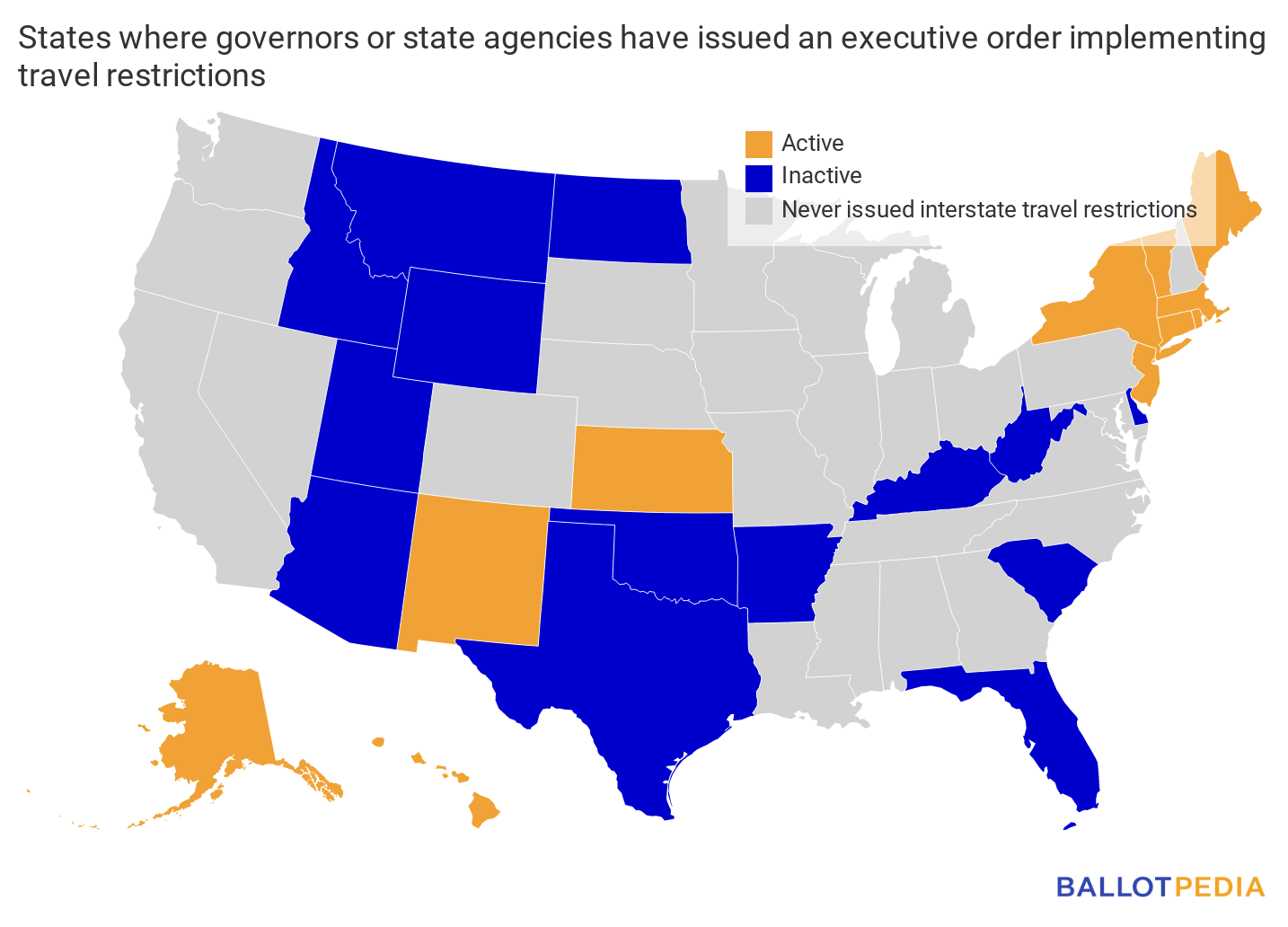|
The next 72 hours
What is changing in the next 72 hours?
- New Mexico (Democratic trifecta): Health Secretary Kathyleen Kunklel extended the state’s stay-at-home public health order and Gov. Michelle Lujan Grisham (D) extended and revised the state’s emergency executive order. Both orders are effective from Aug. 29 through Sept. 18. Under the revised emergency order, indoor dining services will be permitted at restaurants and bars at 25% capacity. Church gathering capacity will be increased from 25% to 40%, and other gatherings of up to 10 people will be allowed. Museums with static (non-interactive) displays will also be able to resume operations.
Since our last edition
What is open in each state? For a continually updated article on reopening status in all 50 states, click here.
- Alaska (divided government): Gov. Mike Dunleavy (R) signed legislation expanding the state’s AK CARES grant program to include businesses that received Paycheck Protection Program or Economic Injury Disaster Loan funds from the federal government. The AK Cares program was introduced on June 1 to provide relief for small businesses that did not receive federal aid.
- Arizona (Republican trifecta): Bars, gyms, movie theaters, and water parks were allowed to begin reopening in Apache, Cochise, Coconino, La Paz, Maricopa, Navajo, Pima, and Yavapai counties. Gyms were allowed to reopen at 25% capacity while the other businesses were allowed to reopen at 50% capacity.
- Illinois (Democratic trifecta): Gov. J.B. Pritzker (D) announced the Department of Health added 10 more counties to the state’s warning level classification, bringing the total number of warning-level counties to 30. The state uses the classification system to identify counties that might need additional mitigation measures.
- Indiana (Republican trifecta): Secretary of State Connie Lawson (R) announced the Nov. 3 general election would proceed without modifications to the voting process. “First, I want to make it clear that we are going forward with a normal election process here in Indiana. We will not be making changes like we did in the primary, since the stay-at-home order has been lifted,” she said.
- Louisiana (divided government): Gov. John Bel Edwards (D) extended Phase Two of the state’s reopening plan, including the statewide mask mandate, 50-person indoor gathering size limit, and statewide bar closure to on-premises consumption, through Sept. 11.
- Maryland (divided government): Gov. Larry Hogan (R) announced that all 24 school districts met the state’s benchmarks for opening to at least some in-person instruction. All school districts have previously announced a return to school with full online learning, while 16 have announced plans to resume at least some in-person instruction starting in mid-September.
- New Jersey (Democratic trifecta): Gov. Phil Murphy (D) signed an order extending the state’s coronavirus emergency declaration. Murphy also announced a $250 million initiative to help families pay for child care and assist child care facilities in reopening.
- Oregon (Democratic trifecta): Gov. Kate Brown (D) announced Hood River and Multnomah counties reduced the spread of the coronavirus and have been removed from the County Watch List.
- Wisconsin (divided government): Gov. Tony Evers (D) announced that the state submitted a grant application to the Federal Emergency Management Agency (FEMA) for an additional $300 per week for individuals receiving unemployment benefits. President Donald Trump (R) signed an executive order on Aug. 8 that allows funds in the Lost Wage Assistance (LWA) program to be used to bolster state unemployment insurance programs.
Daily feature: Travel restrictions
Every Friday, we’ll take a closer look at the restrictions governors and state agencies have placed on interstate travelers, including a recap of the week’s travel-related news. To see our full coverage of travel restrictions enacted in response to the coronavirus pandemic, click here.

Overview
To date, 25 states issued at least one executive order restricting interstate travel. Of the 25 executive orders governors or state agencies issued restricting out-of-state visitors, at least 14 have been rescinded. Eleven states have active travel restrictions.
Weekly recap
- On Aug. 25, Govs. Ned Lamont (D-Conn.), Phil Murphy (D-N.J.), and Andrew Cuomo (D-N.Y.) announced that Alaska, Arizona, Delaware, Maryland, and Montana had been removed from the joint travel advisory list that requires travelers to New Jersey, Connecticut, and New York to quarantine for 14 days. The territory of Guam was added to the list.
Additional activity
In this section, we feature examples of other federal, state, and local government activity, private industry responses, and lawsuits related to the pandemic.
- On Aug. 25, three Wisconsin residents filed suit in Polk County Circuit Court challenging Gov. Tony Evers’ (D) authority to declare a state of emergency and impose a mask mandate. The plaintiffs allege any laws that “may be necessary or appropriate to deal with the COVID-19 pandemic may not be unilaterally imposed by the Governor.” Instead, the plaintiffs contend, the “state of emergency could not be lawfully extended beyond 60 days unless the Legislature, by joint resolution, approved of such an extension.” The plaintiffs allege Executive Order #82, which was issued in July and extended the public health emergency, and the subsequent mask mandate, exceed constitutional and statutory authority. This makes the orders “void because the legislature has not agreed to an extension of the Public Health Emergency due to COVID-19.” Britt Cudaback, a spokeswoman for Evers, said the lawsuit is a Republican effort to “prevent the governor from keeping Wisconsinites healthy and safe.” Rick Esenberg, an attorney for the plaintiffs, said, “[This] lawsuit is about our system of government and the rule of law.” The case has been assigned to Judge Daniel Tolan, who was first appointed by Gov. Scott Walker (R).
|

